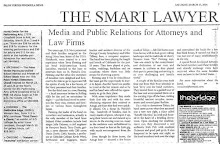When I received the voice mail from a wire service journalist I was home ill with some sort of summer cold/viral ick. I had a headache, my throat was sore, my chest full of flem and I "sounded like a duck" [according to one of my kids]. I had slept for most of 24 hours.
The journalist was putting together a national story on a critical legal issue. Those on the "other side" of the issue had already commented, taking the opportunity to swipe at "us" [the perspective I was representing]. The story needed a balancing comment from our side in order to run. The deadline was looming. The journalist left me a cell phone number.
It was Friday at 4:35pm and I'd been out of my office all day, ill. Could I find someone credible to offer a suitable comment?
I was tempted to pretend I hadn't received the voice mail and to go back to sleep. Instead I started making calls. While I called I was sketching out talking points on the back of an envelope. After fifteen minutes of frantic dialing I was batting .000. No one I trusted to say the right thing could be reached that late on a Friday. It was approaching 5:00pm. So I picked the phone up one last time and called the journalist.
I was honest. Yes I wanted to help but couldn't locate anyone this late in the day. I'd be happy to make a comment myself if needed. My talking points were ready. What could I do to help?
As often happens in the news business, things had changed. The story had morphed and they needed a comment from another group now. The journalist was grateful, but moving on to other things. I reiterated my willingness to help, gave the journalist my cell phone number, and with no small measure of relief I got off the phone.
Checking email I found three emails from that journalist dating back to the morning. Ouch. I really had dropped the ball. But I couldn't help being ill and had done my best to help.
As long as I was at the computer I quickly typed my talking points on the issue and spent a few minutes polishing them --just in case-- until I felt satisfied. Most newsworthy issues never go away. I knew these talking points would come in handy again. I signed off and went back to bed.
On Sunday I received two voice mails. Office and then cell phone. Both from the same journalist. That story had been on hold for two days waiting for another source. That other source had failed to follow through and was no longer returning calls. The journalist was at the airport ready to board a plane. The story needed a comment to run and if it did not run that day it would die. They would even reframe the story to make my comment fit. The journalist had worked on this story for a week and it was in danger of dying! Could I help?!?
I fired up my email while I called the journalist's cell phone. I was forwarding my previously-polished talking points as I listened to the journalist's story again in real time. I sent the email to the journalist as we spoke. The comments were reviewed and I was told "they were perfect." The whole thing took about five minutes.
The story ran. The first hit was in the Chicago Tribune. The next was Forbes. More than two dozen other major hits followed and innumerable secondary market hits. Then the blogs got it. A Google news search for my name the next day found my name and that article in the number one spot and sprinkled down the pages thereafter. That would be called great coverage.
But the best part for me was the journalists' reaction. I received four follow up emails thanking me for taking the call, for following up, for preparing the comments, and mostly for my willingness to do what was necessary to help save that story. I even received a "get well soon" message.
You tell me. Did my fifteen minutes sick-day work result in a long term media relationship that will pay off for years to come?
That was a rhetorical question. The answer is "yes!"
Your reputation is your most valuable asset
Subscribe to:
Post Comments (Atom)







No comments:
Post a Comment